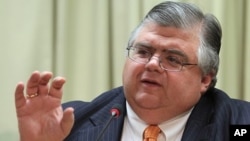The International Monetary Fund warned Saturday that while economic growth in advanced countries has strengthened, some emerging economies are facing weaker commodity prices and exports.
In a communique, the IMF's steering committee said the organization was committed to taking additional measures to support a "more robust, balanced and job-rich global economy."
With the United States poised to hike interest rates, the committee — speaking for the fund's 188 member nations -— said moves toward "policy normalization'' needed to be effectively communicated to reduce adverse impacts on other economies.
Low inflation remains a concern for many developed economies despite signs the European Central Bank's quantitative easing program has boosted Europe's ailing economy, and the communique called for easy monetary policies to be maintained where needed.
"Global imbalances are reduced from previous years, but a further rebalancing of demand is still needed,'' the communique said. That appeared to echo U.S. concerns over Germany's huge current account surplus.
The committee also said that the "possibility of lower growth potential'' was becoming an important global challenge — a topic that the panel's chairman said was central to talks on Saturday.
"I came out of this meeting with a sense of optimism,'' said the chairman, Mexican Finance Minister Agustin Carstens. "The fact that a lot of the discussion basically rotated around how to increase growth ... and not only discussing risks — I think that was a very good sign.''
A three-day spring meeting of the World Bank and IMF concludes Sunday in Washington, amid growing concerns that Greece might fail to reach agreement with its European Union and IMF creditors on a $270 billion financial bailout package. That is one of a number of growing threats that global finance officials say could affect the post-recession economic recovery.
The head of the European Central Bank said there was an urgent need to resolve the Greek debt crisis. Mario Draghi said a Greek default would put the world in what he called "unchartered waters."
There has also been a push at the current meetings to raise the voting power of emerging countries such as China and India at the IMF, as was agreed to in 2010.
The Obama administration supports the reform but has been unable to persuade U.S. lawmakers to agree to the changes at the IMF, where the United States has veto authority.
U.S. Treasury Secretary Jacob Lew said Friday that the Obama administration was continuing to "drive home" the need to modernize the IMF.
He said "Congress needs to act,” adding that continued failure to approve reforms was causing some allies to question a U.S. commitment to the IMF and other multilateral institutions.
Some information for this report came from Reuters.





